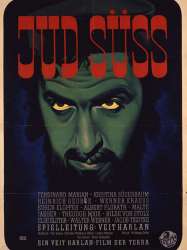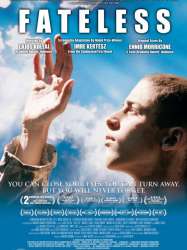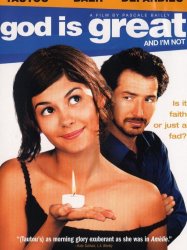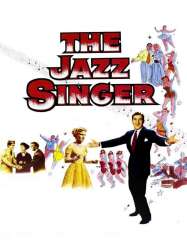Films with theme "Films about Jews and Judaism", sorted by revenue

His People (1925)
Directed by Edward Sloman
Origin USA
Themes Films about religion, Sports films, Films about Jews and Judaism
Actors George J. Lewis, Arthur Lubin, Blanche Mehaffey, Kate Price, Virginia Brown Faire

A Stranger Among Us (1992)
, 1h49Directed by Sidney Lumet
Origin USA
Genres Drama, Thriller, Action, Adventure, Crime, Romance
Themes Films about religion, Films about Jews and Judaism
Actors Melanie Griffith, John Pankow, Lee Richardson, Tracy Pollan, Mia Sara, Jamey Sheridan
Emily Eden (Griffith), a hardened New York City homicide detective, goes undercover to investigate the murder of a Hasidic diamond-cutter. To do so, she lives with the family of the Hasidic rebbe, an elderly Holocaust survivor who is revered for his wisdom and compassion toward his fellow Jews. He says to her, "You and I have something in common: We are both intimately familiar with evil. It does something to your soul."

Fading Gigolo (2013)
, 1h38Directed by John Turturro
Origin USA
Genres Comedy, Comedy-drama
Themes Films about religion, Films about sexuality, Erotic films, Films about prostitution, Films about Jews and Judaism, Erotic thriller films
Actors Liev Schreiber, John Turturro, Woody Allen, Sofía Vergara, Sharon Stone, Vanessa Paradis
Dr. Parker, a wealthy dermatologist, mentions to her patient Murray that she and a woman friend, Robbie, wish to experience a ménage à trois and asks if he knows a willing man. Murray, whose used bookstore has failed, convinces his friend and former employee Fioravante to take the gig, as both are short of money. Soon, they build a thriving gigolo trade with Murray as the pimp. Murray lives with Othella and her children, one of whom gets head lice. Murray takes the boy to Avigal, the attractive widow of a Hassidic rabbi, for treatment.

The Jazz Singer (1927)
, 1h30Directed by Alan Crosland, Gordon Hollingshead
Origin USA
Genres Drama, Comedy-drama, Musical, Romance
Themes Films about music and musicians, Films about religion, Théâtre, Jazz films, Musical films, Films about Jews and Judaism, Films based on plays
Actors Al Jolson, May McAvoy, Warner Oland, Eugenie Besserer, Myrna Loy, Otto Lederer
Cantor Rabinowitz wants his son to carry on the generations-old family tradition and become a cantor at the synagogue in the Jewish ghetto of Manhattan's Lower East Side. But down at the beer garden, thirteen-year-old Jakie Rabinowitz is performing so-called jazz tunes. Moisha Yudelson spots the boy and tells Jakie's father, who drags him home. Jakie clings to his mother, Sara, as his father declares, "I'll teach him better than to debase the voice God gave him!" Jakie threatens: "If you whip me again, I'll run away — and never come back!" After the whipping, Jakie kisses his mother goodbye and, true to his word, runs away. At the Yom Kippur service, Rabinowitz mournfully tells a fellow celebrant, "My son was to stand at my side and sing tonight – but now I have no son." As the sacred Kol Nidre is sung, Jakie sneaks back home to retrieve a picture of his loving mother.

The Gatekeepers (2012)
, 1h35Origin France
Genres War, Documentary, Action, Historical
Themes Films set in Africa, Spy films, Films about religion, Films about terrorism, Documentary films about law, Documentary films about war, Documentary films about historical events, Documentaire sur une personnalité, Documentary films about politics, Documentary films about religion, Documentary films about terrorism, Political films, Films about Jews and Judaism
Dror Moreh a décidé de réaliser ce film après avoir mesuré l'importance décisive du Shabak (Shin Beth) sur la scène politique israélienne depuis quarante ans. Ces six directeurs à la retraite de la sécurité israélienne évoquent leurs victoires et les échecs passés sans nostalgie. Très critiques vis-à-vis des politiques menées par leurs gouvernements (à l'exception de celui d'Yitzhak Rabin), ils défendent tous un changement radical de politique en Israël : la recherche de la paix et la reconnaissance au plus tôt de l’État palestinien.

Süss, the Jew (1940)
, 1h36Directed by Veit Harlan
Genres Drama, Historical
Themes Politique, Films about religion, Political films, Films about capital punishment, Films about Jews and Judaism
Actors Ferdinand Marian, Werner Krauss, Heinrich George, Kristina Söderbaum, Eugen Gottlob Klöpfer, Bernhard Goetzke
The film begins with the coronation of Karl Alexander, Duke of Württemberg (Heinrich George), a man much beloved by his people, who swears an oath to obey the laws of the dukedom "according to the traditional Württemberg loyalty and honesty." However, the Duke soon becomes frustrated because the Württemberg Diet (the provincial council) refuses him the funds needed to maintain a lifestyle comparable to his neighboring sovereigns; in particular, he wants a personal bodyguard, an opera company, and a ballet company. Lacking funds even to purchase coronation gifts for the Duchess (Hilde von Stolz), the Duke sends a courtier to Frankfurt to borrow money from Joseph Süß Oppenheimer (Ferdinand Marian). Süß shows the emissary jewels and jewelry that are obviously beyond the Duke's means and then says that it would be his honor to provide the Duke with jewelry at a substantial discount. However, Süß insists on presenting the items to the Duke personally despite a ban against Jews (Judenbann) entering the city that has been in force for over a century. Armed with a pass from the Duke, Süß cuts his hair, shaves his beard, and dons "Christian" clothes so that he can enter Württemberg disguised as a Christian. As his carriage gets into an accident, Süß gets a lift from Dorothea Sturm (Kristina Söderbaum) to the city.

Fateless (2005)
, 2h14Directed by Lajos Koltai
Origin Hongrie
Genres Drama, War
Themes Films about religion, Political films, Films about Jews and Judaism
Actors Daniel Craig, Piroska Molnár
Un jeune garçon fait l'expérience de la guerre dans ses aspects les plus tragiques (port de l'étoile jaune, rafles, déportation, travaux forcés, dégradations en tout genres, etc.), et dans le même temps, il fait l'apprentissage de la vie et passe de l'enfance au monde adulte (coming of age).

The Pawnbroker (1965)
, 1h56Directed by Sidney Lumet
Origin USA
Genres Drama, Crime
Themes Films about religion, Political films, Films about Jews and Judaism
Actors Rod Steiger, Geraldine Fitzgerald, Brock Peters, Linda Geiser, Jaime Sánchez, Raymond St. Jacques
With the rise of Hitler, Sol Nazerman (Steiger), a German-Jewish university professor, was dragged to a concentration camp along with his family. He saw his two children die (one while riding in a cattle car) and his wife raped by Nazi officers in the camp. Now he operates a pawnshop in East Harlem, while living in an anonymous Long Island apartment. Numbed by his experiences, he has worked hard not to experience emotions. Nazerman is bitter and alienated, viewing the people around him as "rejects, scum." He is shown interacting cynically as he bargains with the many desperate characters pawning their goods.

God Is Great and I'm Not (2001)
, 1h40Genres Comedy, Romantic comedy, Romance
Themes Films about religion, Films about Buddhism, Films about Jews and Judaism
Actors Audrey Tautou, Édouard Baer, Mathieu Demy, Julie Depardieu, Catherine Jacob, Philippe Laudenbach
The film begins with Michèle's first journal entry, "I am 20 years old, and I have ruined my life!" This is just one of the many journal entry titles that are flashed before every particular scene in the film. Michèle had just recently broken up with her boyfriend so she meets up with some of her friends at a café. It is there that she meets the charming veterinarian François. Though Michèle has a promising modeling career, she feels that something, or someone, is missing in her life. François quickly fills this void, and Michèle feels partially whole. She first claims that she is Catholic but is dissatisfied with the results of praying and worshipping. By recommendation, she begins to follow Buddhism through meditation and use of elaborate costume jewelry. Eventually, she discovers that François is Jewish; however, he does not practice his faith. Throughout the film, she immerses herself in Judaism, following traditions such as the Sabbath. François breaks up with her by telling her "your touch sickens me", after accusing her of lying. He then engages in several other affairs but fails to ever marry. She attempts to date a few men but does not create any true connections. Finally, at a wedding of their friend Valérie, Francois has broken up with yet another woman and claims to desire her. The movie ends with the famous line, "...to be continued" leaving viewers curious about their future.

Noah's Ark (1928)
, 2h15Directed by Michael Curtiz, Darryl F. Zanuck, Anthony Coldeway
Origin USA
Genres Drama, War, Musical
Themes Films about religion, Musical films, Political films, Films based on the Bible, Films about Jews and Judaism, Disaster films
Actors Dolores Costello, George O'Brien, Noah Beery Sr., Louise Fazenda, Guinn "Big Boy" Williams, Paul McAllister
The film opens after the great flood, with Noah and his family outside of the Ark praising the Lord. Then comes depictions of the building of the Tower of Babel and the worshipping of the golden calf. Then it switches to the eve of World War I. The theme of the gold calf is carried forward by a scene in which a bankrupted trader (Otto Hoffman) shoots his uncaring stockbroker.

The Diary of Anne Frank (1959)
, 2h55Directed by Nina Foch, George Stevens, David S. Hall
Origin USA
Genres Drama, Biography, Comedy, Historical, Romance
Themes Films about religion, Théâtre, Political films, Films about Jews and Judaism, Films based on plays, Children's films
Actors Douglas Spencer, Millie Perkins, Lou Jacobi, Joseph Schildkraut, Shelley Winters, Richard Beymer
In 1945, as a truckload of war survivors stops in front of an Amsterdam factory at the end of World War II, Otto Frank (Joseph Schildkraut) gets out and walks inside. After climbing the stairs to a deserted garret, Otto finds a girl's discarded glove and sobs, then is joined and comforted by Miep Gies (Dodie Heath) and Mr. Kraler (Douglas Spencer), factory workers who shielded him from the Nazis. After stating that he is now all alone, Otto begins to search for the diary written by his youngest daughter, Anne. Miep promptly retrieves the journal for Otto, and he receives solace reading the words written by his young daughter three years earlier.

The Jazz Singer (1953)
, 1h47Directed by Michael Curtiz
Origin USA
Genres Drama, Musical, Romance
Themes Films about music and musicians, Films about religion, Musical films, Films about Jews and Judaism, Films based on plays
Actors Danny Thomas, Peggy Lee, Eduard Franz, Mildred Dunnock, Alex Gerry, Allyn Joslyn
As Jerry Golding (a young Korean War veteran) scales the heights of show business, he breaks the heart of his father, who had hoped that Jerry would instead follow in the footsteps of six consecutive generations of cantors in their family. Sorrowfully, Cantor David Golding reads the Kaddish service, indicating that, so far as he is concerned, his son is dead. A tearful reconciliation occurs when Jerry dutifully returns to sing the "Kol Nidre" in his ailing father's absence.

Footnote (2011)
, 1h45Directed by Joseph Cedar
Origin Israel
Genres Drama, Comedy, Comedy-drama
Themes Films about religion, Films about Jews and Judaism
Actors Lior Ashkenazi, Alma Zack, Yuval Scharf
Eliezer Shkolnik (Shlomo Bar Aba) is a philologist who researches the different versions and phrasings of the Jerusalem Talmud. He and his son Uriel (Lior Ashkenazi) are both professors at the Talmudic Research department of the Hebrew University of Jerusalem.

Sixty Six (2006)
, 1h33Directed by Paul Weiland
Genres Drama, Comedy, Comedy-drama
Themes Films about religion, Films about Jews and Judaism
Actors Gregg Sulkin, Helena Bonham Carter, Eddie Marsan, Stephen Rea, Peter Serafinowicz, Stephen Greif
Bernie Reubens (Gregg Sulkin), a young Jewish boy, is about to have his bar mitzvah. Initially, he meticulously plans a lavish reception to upstage that of his older brother Alvie (Ben Newton), but as the family's finances lurch from one disaster to another, the family is forced to lower Bernie's expectations and stage the bar mitzvah reception at home in North London. When England reaches the 1966 football World Cup Final, most of the guests make excuses not to come to the reception so that they can watch the game.

Divided We Fall (2000)
, 2hDirected by Jan Hřebejk
Origin Republique tcheque
Genres Drama, War, Comedy
Themes Films about religion, Political films, Films about Jews and Judaism
Actors Bolek Polívka, Jiří Kodet
The film opens in 1939 Czechoslovakia. Horst, a Czech-German Nazi collaborator married to a German woman and co-worker of Josef, brings food to the invalid Josef and his wife Marie, who are Czechs. Josef hates the Nazis. When Josef finds David, who had escaped a concentration camp in occupied Poland after first being sent to the Theresienstadt concentration camp in northern Bohemia, Josef and Marie decide to hide him in their apartment. Horst makes an unannounced visit, bringing presents as usual. Marie is ambivalent about their secret: On one hand she never misses an opportunity to blame her husband for bringing in the Jew, but on the other she is merciful and sympathetic with the poor kid locked in the closet day and night. She suggests that Josef accepts Horst's job offer evicting Czech Jews from their homes, so as to get more protection and deflect possible suspicions. Josef accepts and is considered a collaborator by the neighbor Franta (who had tried to give David over to the Nazi authorities, when he first escaped from a concentration camp). Marie spends the days learning French from David and getting more and more tender toward him. Horst's visits become more frequent, and one afternoon, he attempts to rape Marie.
 Connection
Connection